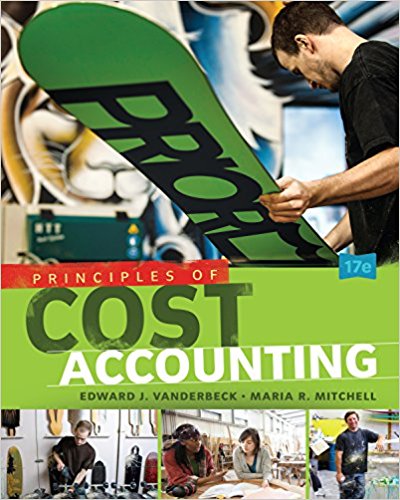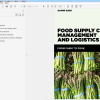(eBook PDF) Principles of Cost Accounting 17th Edition by Edward J. Vanderbeck
$50.00 Original price was: $50.00.$35.00Current price is: $35.00.
(eBook PDF) Principles of Cost Accounting 17th Edition by Edward J. Vanderbeck – Instant Download
(eBook PDF) Principles of Cost Accounting 17th Edition by Edward J. Vanderbeck – Digital Ebook – Instant Delivery Download

Product details:
- ISBN-10 : 1305087402
- ISBN-13 : 978-1305087408
- Author: Edward J. Vanderbeck, Maria R. Mitchel
Discover how readable and relevant cost accounting can be with PRINCIPLES OF COST ACCOUNTING, 17E. This edition packs the essentials you need to know in a unique 10-chapter format that is well organized, practical, and concise. You gain a thorough understanding of cost concepts, cost behavior, and cost accounting techniques as they apply to manufacturing and service businesses. To ensure understanding, the book introduces concepts in small, manageable sections that are immediately reinforced with proven questions, demonstration problems, practice exercises, and self-study quizzes. You master the fundamentals of job order costing and process costing before progressing to more advanced topics, such as budgeting, standard costing and variance analysis, costing for service businesses, and cost analysis for management decisions. Focus on skills that will take you far in today’s competitive job market as you learn how to determine the costs of products and services and how to set effective selling prices. Learn techniques to measure the performance of managers and discover how to use accounting to achieve organization’s goals. Find the relevant approach you need with the most up-to-date presentation of accounting skills in PRINCIPLES OF COST ACCOUNTING, 17E and corresponding CengageNOW online homework tools.
Table contents:
Ch 1: Introduction to Cost Accounting
1.1 Uses of Cost Accounting Information
1.2 Professional Ethics, CMA Certification, and Corporate Governance
1.3 Relationship of Cost Accounting to Financial and Management Accounting
1.4 Elements of Manufacturing Costs
1.5 Illustration of Accounting for Manufacturing Costs
1.6 Cost Accounting Systems
1.7 Illustration of a Job Order Cost System
Appendix: IMA Statement of Ethical Professional Practice
Ch 2: Accounting for Materials
2.1 Materials Control
2.2 Materials Control Procedures
2.3 Accounting for Materials
2.4 Just-in-Time Materials Control
2.5 Scrap, Spoiled Goods, and Defective Work
Ch 3: Accounting for Labor
3.1 Wage Plans
3.2 Controlling Labor Cost
3.3 Accounting for Labor Costs and Employers’ Payroll Taxes
3.4 Payroll Accrual
3.5 Special Labor Cost Problems
Ch 4: Accounting for Factory Overhead
4.1 Identifying Cost Behavior Patterns
4.2 Analyzing Semivariable Factory Overhead Costs
4.3 Budgeting Factory Overhead Costs
4.4 Accounting for Actual Factory Overhead
4.5 Distributing Service Department Expenses
4.6 Applying Factory Overhead to Production
4.7 Accounting for Actual and Applied Factory Overhead
Ch 5: Process Cost Accounting-General Procedures
5.1 Comparison of Basic Cost Systems
5.2 Product Cost in a Process Cost System
5.3 Work in Process Inventories
5.4 Cost of Production Summary-One Department, No Beginning Inventory
5.5 Cost of Production Summary-One Department Beginning Inventory
5.6 Cost of Production Summary-Multiple Departments, No Beginning Inventory
5.7 Cost of Production Summary-Multiple Departments, Beginning Inventory
5.8 Changes in Prior Department’s Unit Transfer Cost
Ch 6: Process Cost Accounting-Additional Procedures; Accounting for Joint Products and By-Products
6.1 Equivalent Production-Materials Not Uniformly Applied
6.2 Units Lost in Production
6.3 Units Gained in Production
6.4 Equivalent Production: First-In, First-Out Method
6.5 Joint Products and By-Products
Ch 7: The Master Budget and Flexible Budgeting
7.1 Principles of Budgeting
7.2 Preparing the Master Budget
7.3 Flexible Budgeting
7.4 Preparing the Flexible Budget for Factory Overhead
Ch 8: Standard Cost Accounting-Materials, Labor, and Factory Overhead
8.1 Types of Standards
8.2 Standard Cost Procedures
8.3 Determination of Variances
8.4 Accounting for Variances
8.5 Interpreting Variances
8.6 Features of a Standard Cost Accounting System
8.7 Illustration of Standard Cost in a Departmentalized Factory Using Process Costing
8.8 Analysis of Factory Overhead Standard Cost Variances
8.9 Two-Variance Method of Analysis
Appendix: Four-Variance and Three-Variance Methods of Analysis
Ch 9: Cost Accounting for Service Businesses, the Balanced Scorecard, and Quality Costs
9.1 Job Order Costing for Service Businesses
9.2 Budgeting for Service Businesses
9.3 Activity-Based Costing in a Service Firm
9.4 Allocations Using Simplified Costing versus Activity-Based Costing
9.5 The Balanced Scorecard and Quality Costs
9.6 Meaning of the Cost of Quality
Ch 10: Cost Analysis for Management Decision Making
10.1 Variable Costing and Absorption Costing
10.2 Merits and Limitations of Variable Costing
10.3 Segment Reporting for Profitability Analysis
10.4 Cost-Volume-Profit Analysis
10.5 Contribution Margin Ratio and Margin of Safety
10.6 Effect of Income Tax on Break-Even Point
10.7 Differential Analysis
10.8 Distribution Costs
People also search:
principles of cost accounting vanderbeck
definition of cost principle
fundamental accounting principles 18th edition answer key pdf
cost accounting horngren 17th edition
openstax principles of accounting volume 1
accounting principles chapter 1 solutions


